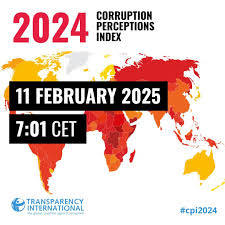Report: 2024 Corruption Perception Index(Summary)
The stakes of the global climate crisis have never been higher, yet progress remains hindered by significant barriers. This week's alarming news from the United Nations highlights the troubling delay in updating climate pledges, with nearly 95 per cent of countries missing the deadline to submit their updated nationally determined contributions. These climate plans represent efforts by each country to reduce national emissions and adapt to the impacts of climate change.
They are essential to limiting the global temperature rise to 1.5°C. With major emitters like China, India and Canada failing to submit, and only 13 of the 195 signatories to the Paris Agreement meeting their obligations, we are left questioning: where is the political will for action?
One of the key challenges undermining timely and effective climate action is the broader issue of leaders not being accountable and not acting in the public's best interests. We highlighted this earlier in the week when launching the 2024 Corruption Perceptions Index (CPI), Transparency International’s ranking of 180 countries by their perceived levels of public sector corruption.
Our research reveals the serious dangers of climate corruption, which often occurs through polluting industries unduly influencing decision-makers to block progress towards sustainability. Around the world, corruption is also leading to misallocation of climate funds, environmental damage and impunity for attacks on climate activists. Two-thirds of countries score below 50 out of 100 on the CPI, which raises huge red flags about their ability to stop these violations.
In South Africa (CPI score: 41) for example, around a billion rand (more than US$56 million) is stolen each month from Eskom, the state-owned energy provider, according to its former chief executive.
Corruption undermines climate adaptation and mitigation efforts, delaying the transition to renewable energy and hindering life-saving resources for billions of people. We are seeing worrying trends of governments prioritising fossil fuel interests over urgent climate action, from anti-protest laws in Europe to the US reversing a decision to halt the Dakota Access Pipeline, ultimately allowing its completion after years of litigation, and benefiting corporate interests over climate protection.
Across different regions, corruption damages the environment in various ways, from ruining climate initiatives to violating ecosystems. In Russia (22), an audit found strong indications that millions of dollars were misappropriated from a Global Environment Facility-funded project. The project reportedly failed to meet any of its emissions reduction targets. Similarly, in Vietnam (40), systemic corruption involving bribes to officials facilitated illegal timber smuggling, contributing to deforestation and environmental destruction.
Corruption also obstructs policies aimed at solving the climate crisis. Even in relatively high-scoring countries like Germany (75) and France (67), corporate influence continues to delay and even dismantle critical climate policies. Although both countries have strengthened lobbying transparency in recent years, additional loopholes must be closed to prevent private interests from unduly influencing the climate agenda.
In other countries, however, like the Seychelles (72), notable progress has been made against corruption, highlighting that strong governance can create a foundation for climate resilience – this climate-vulnerable country is now in a significantly stronger position to adapt to the effects of climate change.
Denmark (90), the highest-ranking country on the CPI, is well-prepared for addressing climate change, with 95 out of 98 municipalities having climate action plans aligned with the Paris Agreement. Its climate policy is, however, still vulnerable to lobbying influence and lack of transparency in decision-making processes.
By putting integrity at the heart of climate policies and governance, we can step up the fight against global heating, safeguard climate finance and resources, support vulnerable communities and rebuild trust in climate initiatives. Governments must also protect environmental activists and whistleblowers, and ensure citizens have a central voice in shaping climate initiatives.
A sustainable world may seem far away but we can accelerate progress if we all fight corruption head-on.



